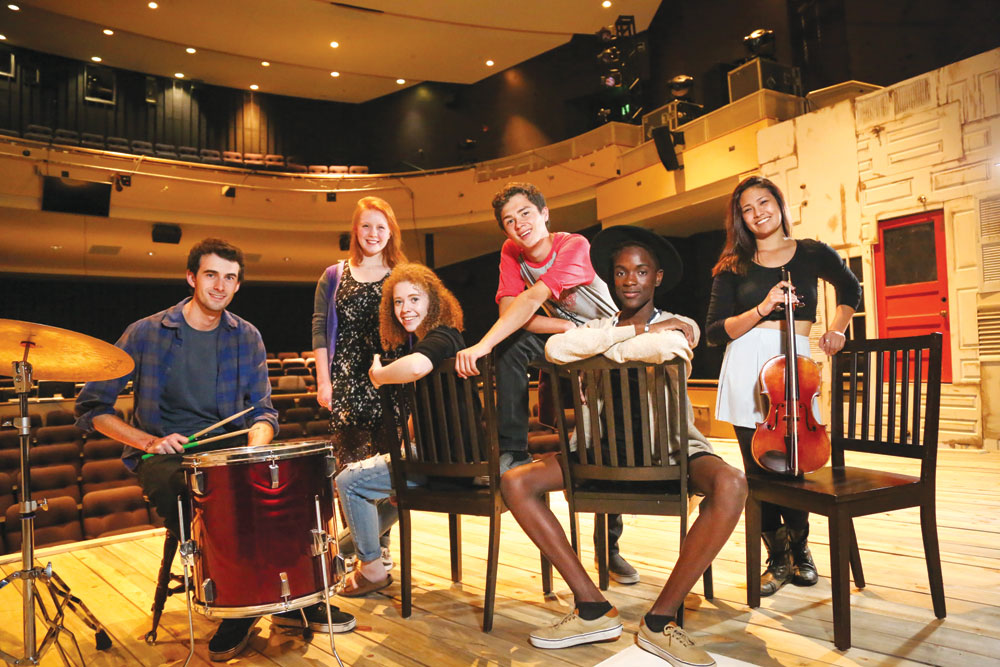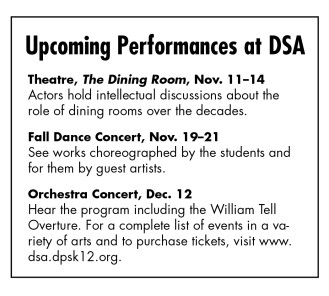
Denver School of the Arts students gather on the main stage. Left to right: Pierce Cram, senior, vocal; Lydia Thompson, junior, theatre; Alica Saper, senior, theatre; Riley Watson, sophomore, theatre; Deja Von Crittendon, sophomore, stagecraft and design; Katherine Guerrero, senior, orchestra.
Denver offers a wealth of opportunities to experience the performing arts on a professional level. But nestled just off of Quebec and Montview Blvd., a wide range of performances can be enjoyed at Denver School of the Arts. While some may envision school performances only a parent could love, DSA delivers polished shows to the public, reflecting the hours of lessons, study and rehearsal DSA students go through.
Nearly every weekend throughout the school year, DSA puts on shows covering their variety of majors including orchestra, dance, theatre, visual arts and video cinema arts. Performances are not just for the experience of being in front of an audience. The ticket prices, which generally range from $10–$14, help pay for weekly guest artists to work with the students, for performance production costs and to help augment costs associated with travel to competitions and conferences.
Ticket sales from the fall and winter orchestra concerts, for instance, help provide scholarship money for the orchestra to attend The Midwest Clinic in Chicago in December, considered the most prestigious forum for orchestras and bands in the country. The orchestra is one of four in the country invited to play. “To get invited to play is really rare and an honor,” says Dr. Enrique Lasansky, director of orchestras at DSA.
In Lasansky’s middle- and high-school orchestras and chamber music groups, students spend 90 minutes in school rehearsing new music for each concert. After school, they take private lessons and spend hours practicing and, in some cases, also work with other youth orchestras.
Despite the intensity, the majority of students will not become professional musicians due to high competition and limited job options. The hope, though, says Lasansky is that “they will have a solid background in the arts and will continue playing either in community groups, semiprofessional groups or chamber music and will become consumers of the arts.” Plus, he adds, the skills students learn as musicians are applicable to other fields and have been shown to increase intelligence.
Eighth-grader Isabelle Oss is an example of a student committed to her music now but without designs on a musical career. She plays piano and ukulele but focuses on violin at DSA. Despite the time and effort she devotes to music, Oss wants to be a surgeon someday, but says music will always be part of her life. “I don’t remember a time when I didn’t have music in my life,” she says.
 Like Oss, Perri Earnest, a senior dance major, doesn’t want to be a professional dancer but is considering teaching. Earnest, who takes dance classes almost nightly plus classes and rehearsals in school, feels she has gained good life experience through her art. “I’ve gotten a great school education and life skills,” she says. “It’s prepared me to deal with all different kinds of people.”
Like Oss, Perri Earnest, a senior dance major, doesn’t want to be a professional dancer but is considering teaching. Earnest, who takes dance classes almost nightly plus classes and rehearsals in school, feels she has gained good life experience through her art. “I’ve gotten a great school education and life skills,” she says. “It’s prepared me to deal with all different kinds of people.”
That’s one of the main goals, says Brandon Becker, one of two theatre directors at DSA whose department puts on up to 11 shows per year, requiring several hours of after-school rehearsal. He feels there are many benefits for students who have a background in the arts, even if they don’t pursue it as a career. “Our mission as a department is to create good citizens who are able to articulate their point of view about the world and art,” he says. Becker feels the skills students learn easily translate to any field. “The tools of working together as an ensemble, problem solving, thinking outside the box—all those things contribute to what are now considered 21st- century skills,” he says.
Becker feels all of the various shows DSA puts on are great for the community to see. In the theatre department, some shows are very family-friendly, while others, like November’s The Dining Room are more intellectual with adult topics, best for ages 10 and up. He recommends parents read the descriptions of the plays on the website to determine the level of appropriateness for their children.
Oss feels people will be surprised to see how good the school’s performances are. “There’s something really great going on blocks away from their house and they don’t know about it quite yet.” She also feels it could be motivating for other kids to see what can be done with the arts. Earnest agrees. “I think a lot of younger kids get put into dance classes by their parents when they are little and they don’t always love it, but I think getting to see kids a little older than you performing and having a great time, it’s really inspiring and beneficial that they see it.” She also sees a bigger picture. “It’s impressive to walk into our school and see the artwork and everything that’s going on,” she says. “It’s really lovely to see and to help keep the arts alive and thriving.”



0 Comments